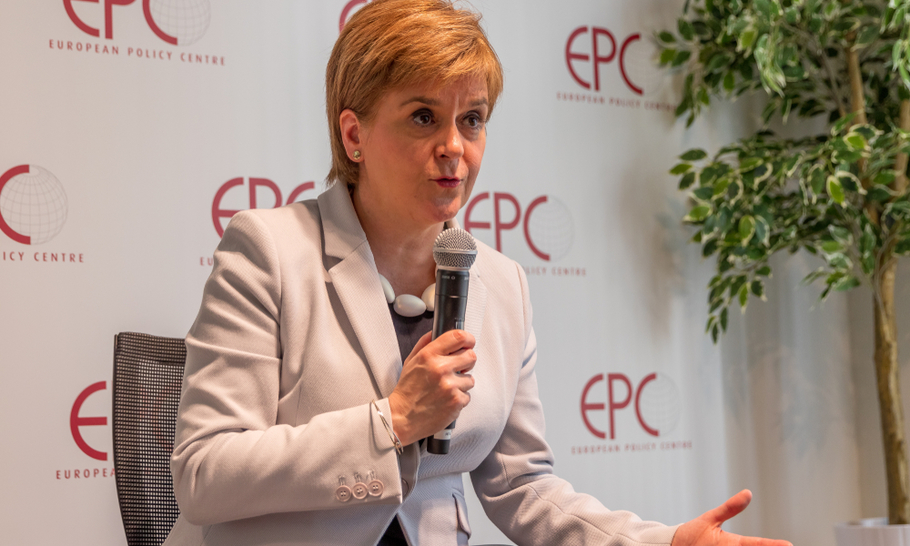Britain’s Scottish problem

(Shutterstock)
The veteran SNP politician John Mason stated last week that support for Scottish independence must be over 70 per cent before another referendum is called. A YouGov poll in January found the actual figure is 51 per cent, some way short of that threshold. But Mason is out of step with his boss Nicola Sturgeon who, emboldened by the SNP’s general election performance, wants a second referendum this year.
The Prime Minister has booted that demand into the long grass arguing that the 2014 independence vote, which was lost 55/45 by those wishing to secede, was meant to settle the issue for a generation. Sturgeon argues that the conditions for Scotland have materially changed, given the UK’s departure from the EU was opposed by 62 per cent of Scots.
That position is puzzling for two reasons. First, Scotland’s decision to remain in the UK renders it part of a geographic polity which means taking the rough with the smooth. There is no reason why the Mayor of London couldn’t similarly argue for the capital to break away as a city-state given that a majority of its inhabitants were pro-remain. Second, if independence rather than anti-Englishness is the driver, it seems odd that Scotland would seek to free itself from the shackles of a decision-making body in Westminster that it considers remote, in order to run towards the arms of another: the EU.
But the Prime Minister should consider granting a second referendum on independence for Scotland provided that the electorate across the UK, not just the Scots, has a say. Given that UK taxpayers contribute to the provision of spending on public services in Scotland, which is 20 per cent higher per capita than in England, it is only fair that their views should be taken into account.
Scottish MPs who sit in the House of Commons have for many years voted on matters affecting the rest of the UK, but which are devolved to the Scottish Parliament. This constitutional anomaly is compounded by glaring differences such as Scottish students not being required to pay tuition fees, which are funded, in part, by taxpayers in the rest of the UK.
The SNP need not worry. If a majority of Scots voted for independence and the rest of the country did not, they would still leave. They would also depart if the Scottish people voted to stay and the rest of the country wanted them to go.
It is only Scots who would like to remain part of the UK that should be concerned about such a vote. In the event of a minority in Scotland voting for independence and a majority in the rest of the UK voting for it, Sturgeon would have to deal with a situation where Scots were forced out against their will.
This possibility should force Sturgeon to clarify three issues: what currency a newly independent Scotland would have; how Scotland would join the EU; and how the border between an independent Scotland and the rest of the UK would be managed.
The assumption that Scotland would automatically continue to use the pound sterling until it was replaced by the euro is misplaced. How a Scottish government could rule effectively when the body that controls its monetary policy is located in another jurisdiction is unclear. There is also the political question of why Boris Johnson would agree to the currency being used by a separate country with a completely independent fiscal regime.
Sturgeon also believes that the EU would agree to admit Scotland to its ranks, no doubt encouraged by the warm sentiments expressed by Donald Tusk, former President of the European Council. But the accession of any new member requires unanimous approval from the existing 27 members. It would be surprising if Spain, which is battling its own separatist insurgency in Catalonia, were to support Scotland’s entry to the bloc for fear of accelerating the break-up of its own country. The 7 per cent budget deficit in Scotland — above the maximum level of 3 per cent allowed by the EU — would also mean cuts to public spending.
Then there is the question of how a land border between a Scotland that hopes to accede to the EU, and the rest of the UK would be managed given that 60 per cent of its trade is with the UK. Does the SNP envision the installation of border posts at Berwick-upon-Tweed?
These questions must be answered. Nicola Sturgeon herself spent the past three years calling for the British government to outline in detail what its future relationship would be with the EU. It would be useful for her to similarly enlighten us so that the electorate across the UK can make an informed decision on the vexed question of Scottish independence.




